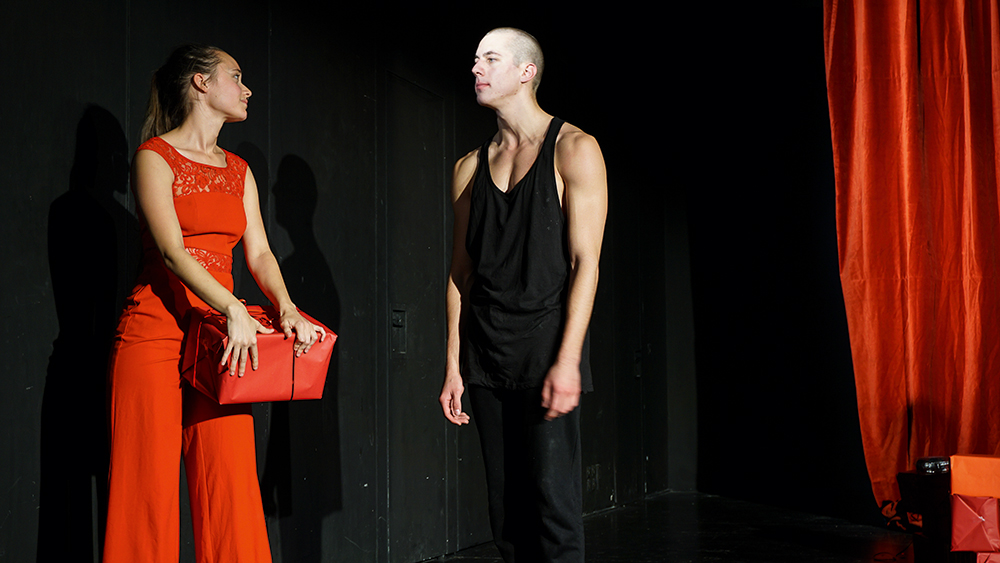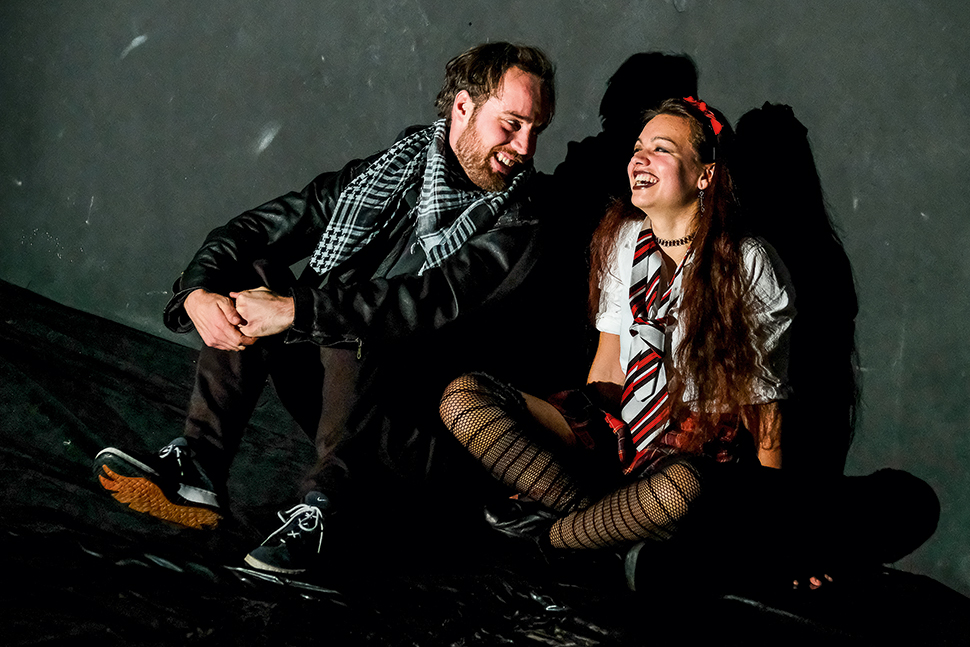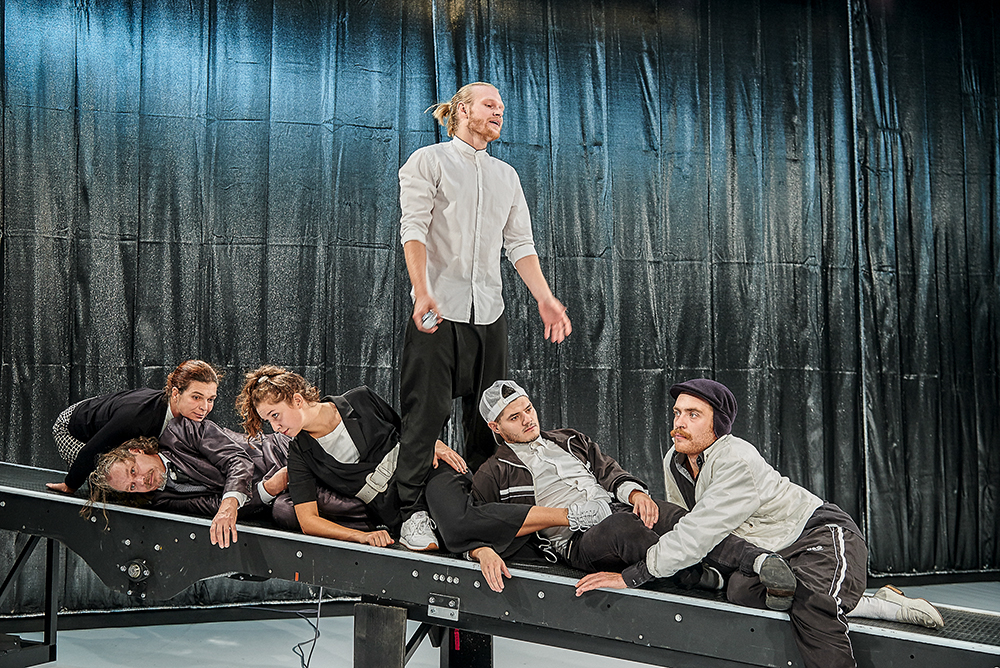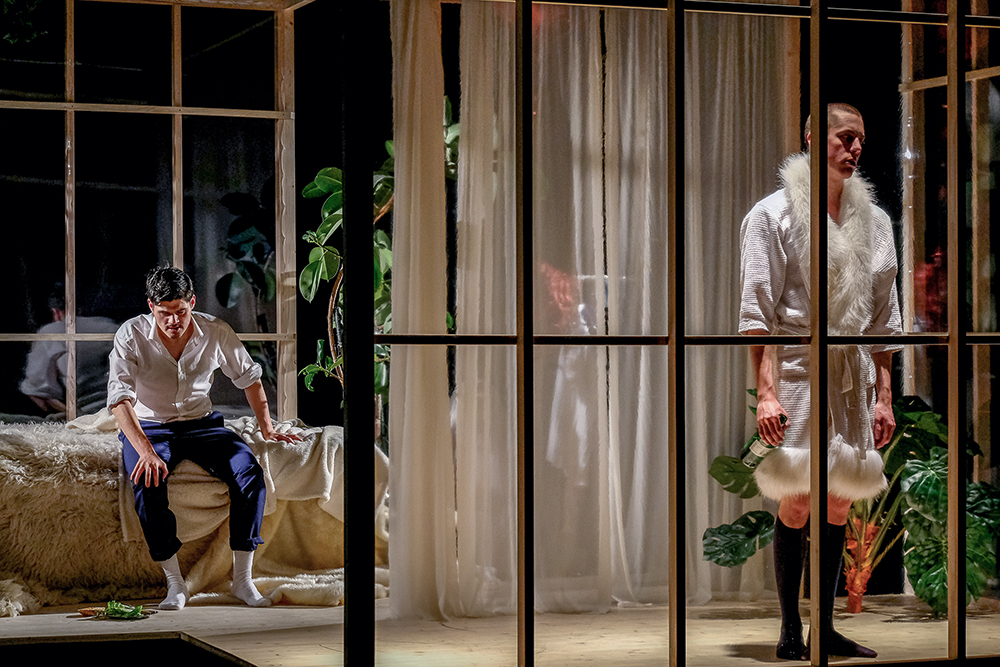Holle Münster, Stefan Schweigert, Maria Sendlhofer, Mira Stadler, and Alexandru Weinberger-Bara are all graduates or current students in the Max Reinhardt Seminar’s stage directing programme. They joined mdw Magazine to talk about their experiences, current projects, and wishes for the future.

“When the audience is touched in one way or another, it means that—as a director—you’ve done at least something right. And if they’re still thinking about what the production was trying to say five minutes after the curtain has dropped, you’ve almost won,” comments Mira Stadler. In her work, directing major Stadler is fond of dealing with the body, motion, and dance—and she benefits immensely from being taught together with the acting students in joint courses that are an integral part of the directing curriculum at the Max Reinhardt Seminar. “Only when you’ve tried something out onstage yourself do you realise how difficult it can be to carry out a director’s request from ‘below’. And this realisation gives you a much more human understanding of what it means to direct,” says the Klagenfurt native.
As her studies have progressed, she’s become increasingly conscious of the fact that they contain a great deal of guided learning by doing. “You can talk about it forever, but in the end, you just have to do it. What’s still hardest for me is being confident that my own ideas will actually work.” At the moment, Stadler is busy preparing her diploma play, which will première in March 2018. In selecting works to realise, she places particular importance on plays by and roles for women: “I’d like to chip away at the tradition of the male narrative at least a little bit.”

Alexandru Weinberger-Bara was already sure he wanted to become a stage director back when he was still a teenager. “What fascinates me most is the enormous power of this medium to make abstract ideas materialise before an audience. In theatre, you can commit transgressions without destroying the delicate matrix we call society,” explains the 22-year-old. Looking back on his time at the mdw—he’s already completed his four years of coursework under Anna Maria Krassnigg and Martin Kušej—one thing he remembers quite prominently is of the diversity of approaches and opinions that he encountered: “When you do a project, you can get two different pieces of feedback from professional theatre people. That’s not always an easy thing while you’re busy learning, but when I think back to it now, it did contributed greatly to the development of my individuality as an artist.” Weinberger-Bara will be officially completing his studies in November with his diploma production of Foxfinder. This dystopian play by Dawn King (2011) is set in a totalitarian England, where fear, state surveillance, and arrests are the order of the day. “Being from a former communist country myself, I can say that it was the play that found me, more than the other way around.” Another major reason why he selected King’s work, he says, was its subtle characterisation.
Another person who places great importance on characters is Maria Sendlhofer. “One of the things I’m constantly trying to do is approach characters with respect rather than simply passing judgment on them,” analyses the Salzburg native, who was born in 1988. Studying stage directing, she says, was at first an experiment—but it very quickly turned out to be what was right for her. For Sendlhofer, the most important ingredient for a strong, multilayered production is teamwork. “Giving all participants enough latitude to really involve themselves is the best path to creating something that everyone can stand behind. By that, I don’t mean compromises in the interest of preserving harmony—I’m all for respectful, constructive conflict.”

For her diploma production, which premières on 13 December, she’s chosen Henrik Ibsen’s The Lady from the Sea (1888). At the centre of this story is the lighthouse attendant Ellida, who lives in a small Norwegian coastal town. Her marriage with the physician Wangel brings her but little happiness. And increasingly, Ellida feels emotionally torn between her husband and a mysterious sailor. At the production’s present stage of development, it’s still about discovering just what kind of story her version should tell, says Sendlhofer. “In any case, it will be an evening that deals with breaking out of patterns, routines, and norms to follow a self-determined path.”
Director Holle Münster graduated from the Max Reinhardt Seminar in 2012 and has since arrived in the thick of professional life. She, too, has vivid memories of being taught together with the acting students. “Every director has their own way of rehearsing; we weren’t taught that it had to be any particular way. But the coursework together with the actors did make it easier for me to find my own mode, which naturally has continued developing to this day.“
Since 2011, the 34-year-old Brandenburg native has been part of the German directors’ collective Prinzip Gonzo, which is active both in publicly run theatres and in the off- scene. And she’s very grateful for the people with whom she works, Münster emphasises: “Mine is a profession where loneliness is something you just have to deal with, because you do a lot of traveling. Your workday isn’t just thinking up funny ideas for Hamlet—it’s really your entire life, which you shape along with the theatre you do.”

On 13 October, Münster’s production of Vereinte Nationen will première at Volx/Margareten in Vienna. This play by Clemens J. Setz tells of a couple that earns money by putting videos of their seven-year-old daughter online. Their community of viewers soon starts demanding more unusual stuff—and eventually, lines get crossed. Here, Münster thinks that a surreal form is the right way to portray the horror that rears its ugly head amidst the seemingly normal. “What is humanity, and where does it end? These are the questions that we’ll be grappling with onstage.”
The essentially human in a private setting is also a theme in the diploma production of Stefan Schweigert (première: 24 January). The German directing major, who had gathered experience as a director’s assistant before he began studying, decided on Anatol. This series of one-act plays by Arthur Schnitzler deals with the synonymous main character’s inability to form relationships, repressed fears, and empty ideals—material that Schweigert considers to be highly current. Feelings of loneliness, questioning of values, and disorientation are also themes of his own generation, he says.
The 26-year-old views the fundamental added value of theatre as being its ability to make the audience empathise: “This is something that, due to the fast-paced character peculiar to today’s world, is getting more and more lost: taking time, looking at something closely, and really opening oneself up to themes and feelings. The fact that it’s live and happening right before us allows theatre to break up the modes of seeing things to which we‘ve become accustomed.”
A possible long-term goal of Schweigert‘s is to head a theatre himself: “As an ensemble, you represent a way in which people desire to coexist. In theatre, one quite often encounters extreme disrespect and brutal hierarchies. My opinion, however, is that decisions don’t have to be made and enforced with an iron fist from above. And that’s also something that our school here stands for: ensemble spirit, which I take very seriously.”
Current productions of the Max Reinhardt Seminar.

